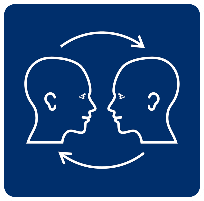- My child has learning difficulties – could AAC help them?
“Learning difficulties” is a very broad term, and everyone with learning difficulties is different. If your child has problems understanding or using spoken language they might benefit from some form of AAC. This could be a system for using signs or symbols, or a communication aid. What to use depends on the individual child and the people they are communicating with.
- What types of support are available to help my child learn to communicate better?
Your child’s speech and language therapist (SLT) should be the first point of support to help them develop their skills. If your child needs AAC, they should be assessed by a therapist with specialist knowledge in this field. If there is no local SLT with these skills, you can ask for an assessment at a regional specialist centre.
Once an AAC system or systems have been identified for your child they and their carers will need ongoing teaching, support and reviews. Ideally this will be provided by your local SLT team or specialist teachers.
There are also groups such as 1Voice that offer support for families and role models for young AAC users, to support their communication development.
- What does developmental disability mean? Will they get better?
This is an umbrella term that covers lots of different diagnoses and disabilities. Developmental disability is often present from birth, but might not be identified until later in childhood. It means that a child does not follow the usual developmental course of childhood.
Developmental disability is when the overall development of a child differs from the typical in either the rate of achieving milestones or the order in which the milestones are reached. The child may be affected in one or more skill areas including physical development, learning, speech and communication, and social skills.
Some people who have been described as having a developmental disability might “catch up” over time; others will not do so and might always have a greater or lesser degree of difficulty.
- Will they always need help with communication?
This depends on your child’s level of developmental disability, as all children are different. Evidence shows that introducing AAC systems to support their communication will not stop their speech developing. Children who are supported to develop speech skills through AAC can stop using the system if they no longer need it. Some people with developmental disabilities will go on to develop successful communication skills; others will need ongoing support throughout their lives.
See also
- FAQs – AAC and Autism Spectrum Disorder (ASD)
- FAQs – AAC and cerebral palsy (CP)
- FAQs – AAC and developmental difficulties
- FAQs – AAC and employment
- FAQs – AAC and general paediatric care
- FAQs – AAC and hospitalisation
- FAQs – AAC and locked-in syndrome
- FAQs – AAC and Parkinson’s Disease (PD)
- FAQs – AAC and stroke and aphasia
- FAQs – AAC and training
- FAQs – AAC assessment and clinical decision-making
- FAQs – the law, policy and services





